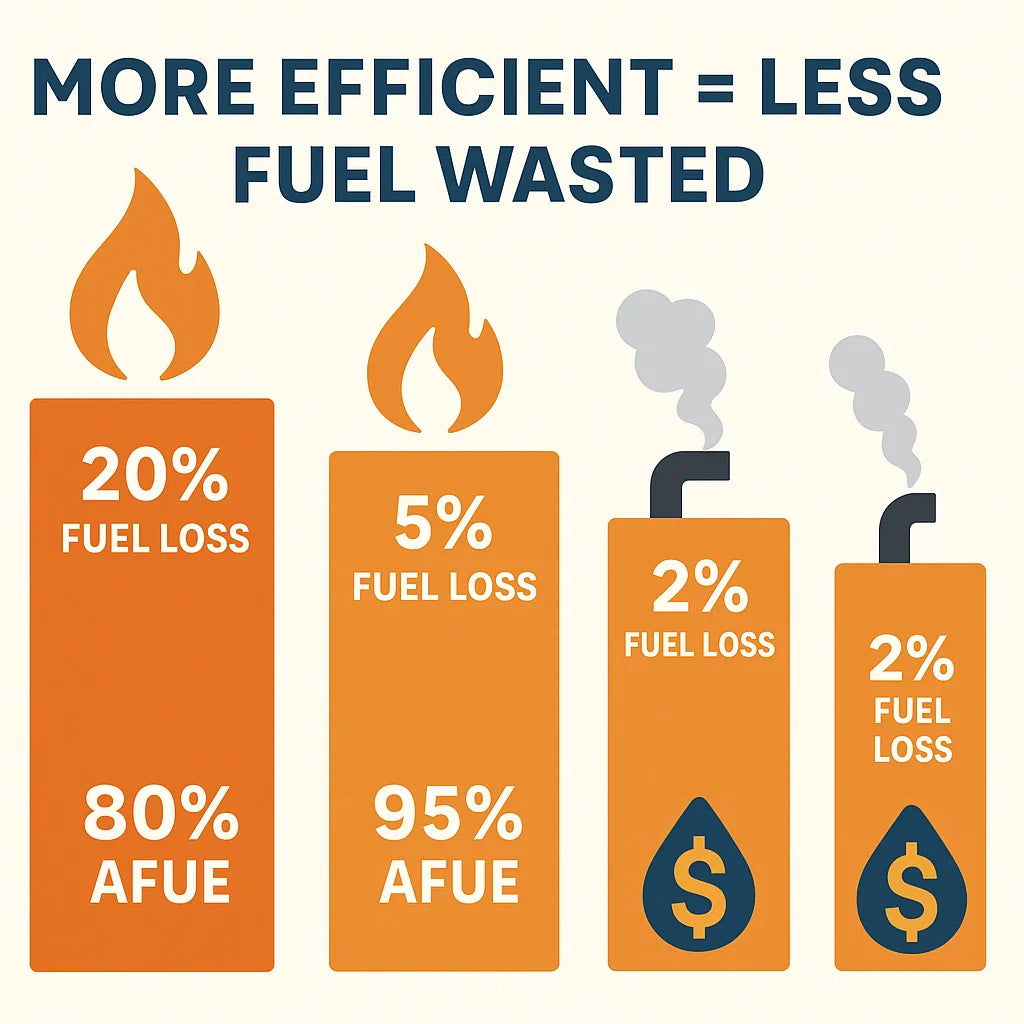By Alex Lane | Your Home Comfort Advocate
Upgrading to a high-efficiency furnace can feel like a leap—especially when the price tag is thousands of dollars more than a standard unit. So the big question is: is it really worth the investment?
Let’s walk through the real-world numbers, energy savings, and rebate programs to help you decide. Spoiler: the answer depends a lot on where you live, how much you pay for fuel, and how long you plan to stay in your home.
What Is a High-Efficiency Furnace, Exactly?
Understanding AFUE (Efficiency Ratings)
At the heart of the term “high-efficiency” is a number called AFUE, or Annual Fuel Utilization Efficiency. It's a percentage that tells you how much of your fuel actually gets converted into usable heat.
-
Standard furnace: 80% AFUE = 80¢ of every $1 goes to heat, 20¢ is wasted.
-
High-efficiency furnace: 95–98% AFUE = Only 2–5¢ lost per $1 of fuel.
Key Components That Boost Efficiency
These ultra-efficient models do this with advanced components like:
-
Secondary heat exchangers that squeeze more heat from exhaust gases
-
Sealed combustion chambers that draw air from outdoors
-
Variable-speed blowers that match airflow to demand
Browse High-Efficiency Furnace Models
Want to see what’s available? Browse our high-efficiency furnaces collection for top-rated models from trusted brands.
Upfront Costs vs. Long-Term Savings
Equipment and Installation Cost Comparison
-
Standard furnace (80% AFUE): $2,500–$4,000 installed
-
High-efficiency furnace (95%+ AFUE): $3,500–$7,500 installed
That’s a difference of $1,000–$3,000 in most cases.
Energy Bill Reduction Over Time
According to Energy.gov, heating accounts for roughly 45% of a typical U.S. home’s energy bill. So even a 15–18% gain in efficiency can shave hundreds per year off your gas bill.
For example:
-
If your annual gas bill is $1,200…
-
Upgrading from 80% to 96% AFUE could save ~$240/year
-
That adds up to $2,400 over 10 years
Using ENERGY STAR’s Savings Calculator
Use the ENERGY STAR calculator to plug in your specific usage and see personalized estimates.
Your Climate Plays a Huge Role
Cold vs. Mild Climates: Impact on ROI
If you live in a cold climate like Minnesota, New York, or the Canadian Prairies, a high-efficiency furnace will work hard—and often, making it far more likely to pay for itself quickly.
Government Data on Heating Zones
The EPA’s Heating and Cooling Degree Days shows that heating demands vary significantly across the U.S.—with northern regions seeing nearly double or triple the annual degree days compared to southern states.
Translation: the colder your winters, the faster a high-efficiency furnace pays for itself.
What About Your Home’s Size and Insulation?
Bigger Homes Benefit More
Efficiency gains are magnified in larger homes and older, less-insulated buildings—where the furnace runs frequently.
Is Your Home Energy Efficient Already?
If your home is a newer build or already has good insulation and windows, you might not get as much mileage from upgrading. In that case, a mid-efficiency unit could be a smarter investment.
Do High-Efficiency Furnaces Last Longer?
Maintenance Considerations
High-efficiency furnaces have extra parts like:
-
Condensate drains
-
PVC venting
-
Sealed combustion chambers
All of these require annual inspections and cleanings to keep things running smoothly.
Common Repairs and Servicing Needs
You may occasionally need to replace or service:
-
Drain pumps
-
Pressure switches
-
Inducer motors
These are usually minor but add up if neglected.
Expected Lifespan
According to ENERGY STAR, a well-maintained furnace—especially a high-efficiency model—can last up to 20 years or more. Regular maintenance not only preserves efficiency but also helps you avoid costly breakdowns during peak heating season.
Rebates, Tax Credits, and Incentives in 2025
U.S. Federal Programs (IRA & ENERGY STAR)
Thanks to the Inflation Reduction Act, you can get up to $600 in tax credits for qualifying high-efficiency gas furnaces.
State and Utility Rebates
Many states and energy providers offer extra rebates. Use the DSIRE rebate database to search by zip code and see what you qualify for.
Canadian Incentives
Through the Canada Greener Homes Initiative, Canadians can access rebates for ENERGY STAR-certified furnaces, especially when bundled with insulation or air sealing upgrades.
When a High-Efficiency Furnace Isn’t Worth It
Moving Soon?
If you’re planning to sell your home within the next 2–3 years, you may not live there long enough to recoup your investment.
Mild Climate or Low Usage
In warmer zones where heating demand is low, an 80% AFUE model may be more cost-effective.
Still Running a Mid-Age Furnace?
If your current unit is under 10–12 years old and works fine, a simple tune-up might stretch its life another few seasons.
So… Is It Worth the Investment?
Quick Decision Checklist
✅ Choose high-efficiency if:
-
You live in a cold climate
-
You plan to stay 7+ years
-
You qualify for rebates
-
You use your furnace daily in winter
❌ Stick with standard if:
-
You’re moving soon
-
You only run your furnace occasionally
-
Your current bills are already low
Who Gets the Most Value
Homeowners in older homes, colder zones, and long-term living situations usually see the best return.
Next Steps: Browse Trusted Models
If you're ready to compare systems, visit our High-Efficiency Furnace Collection for vetted, name-brand units at outlet prices.
💬 Final Thoughts from Alex Lane
A furnace isn’t just a piece of equipment—it’s the heart of your home’s winter comfort. If you’re dealing with high bills, an aging system, or just want to reduce your carbon footprint, a high-efficiency model can be a smart, forward-thinking upgrade.
Just make sure it fits your home, your budget, and your long-term plans. When in doubt, get a quote and compare your options. The math often speaks for itself.
Stay warm,
Alex Lane
Your Home Comfort Advocate







